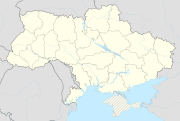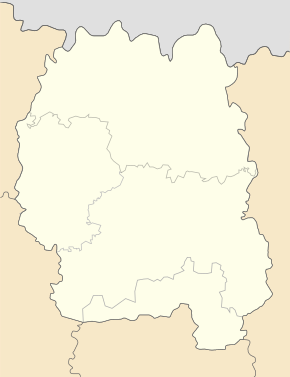Owlutsch
| Owlutsch | ||
| Овруч | ||

|
|
|
| Basic data | ||
|---|---|---|
| Oblast : | Zhytomyr Oblast | |
| Rajon : | Owrutsch district | |
| Height : | 149 m | |
| Area : | 8.88 km² | |
| Residents : | 16,896 (2004) | |
| Population density : | 1,903 inhabitants per km² | |
| Postcodes : | 11100-11109 | |
| Area code : | +380 4148 | |
| Geographic location : | 51 ° 19 ′ N , 28 ° 48 ′ E | |
| KOATUU : | 1824210100 | |
| Administrative structure : | 1 city | |
| Mayor : | Valery Schwab | |
| Address: | вул. Радянська 43 11101 м. Овруч |
|
| Statistical information | ||
|
|
||
Ovrutsch ( Ukrainian and Russian Овруч , Polish Owrucz ) is a city in the Zhytomyr Oblast in the Ukraine with about 17,000 inhabitants (projection January 1, 2005). The city is located on the banks of the Noryn ( Норинь ), an 88 km long tributary of the Ush in the historical region of Polesia . Ovrutsch is the administrative center of the largest Rajon of the Zhytomyr Oblast with 3,225 km² .

history
First mentioned in 977 as Vruchy ( Вручий ), Ovrutsch was a settlement of the Kievan Rus . After Korosten was sacked , it became the administrative seat of the Drewljan tribe . The Church of the Transfiguration stands on the site of the castle from this time. The city's oldest church, however, is St. Basil's Church from the 12th century, which was restored by Alexei Shtusev in 1907–1909 . Ovrutsch became part of the Principality of Galicia-Volhynia , from the 14th century onwards of the Grand Duchy of Lithuania . In 1483 the Crimean Tatars destroyed it . The Union of Lublin (1569) made Polesia a province of the Polish-Lithuanian aristocratic republic . In 1641 Władysław IV. Wasa Owrucz declared a royal city. During the Second Partition of Poland (1793) it was annexed by the Russian Empire . Since the collapse of the Russian-dominated Ukrainian Soviet Socialist Republic (1922–1991) it has belonged to the independent Ukraine . The communist rule left a long-lasting memory in the form of the radioactive contamination of the area from the nuclear disaster in neighboring Chernobyl (1986), even if Ovrutsch himself was only slightly affected.
On April 13, 2017, the city became the center of the newly founded municipality of Ovrutsch ( Овруцька міська громада Owruzka miska hromada ). At this still count the 68 villages Basariwka (Базарівка) Barvinkove (Барвінкове) Bohdaniwka (Богданівка) Bondari (Бондарі) Bondariwka (Бондарівка) Chlupljany (Хлупляни) Diwoschyn (Дівошин) Dowhynytschi (Довгиничі) Dubowyj Haj ( Дубовий Гай) Hajewytschi (Гаєвичі) Hoschiw (Гошів) Hunytschi (Гуничі) Jazkowytschi (Яцковичі), fireplace (Камінь) Klynez (Клинець) Kolossiwka (Колосівка) Koptiwschtschyna (Коптівщина) Kopeniwka (Коренівка) Koptschiwka (Корчівка) Krasnosilka (Красносілка) Kyrdany (Кирдани) Lukischky (Лукішки), Mala Chajtscha (Мала Хайча), Mala Fosnja (Мала Фосня), Mala Tschernihiwka (Мала Чернігівка), Maly Kobylyn (Малий Кобилин), Mali Moschky ( Малі Мошки) Mametsch (Мамеч) Motschulnja (Мочульня) Moschtschanyzja (Мощаниця) Myschkowytschi (Мишковичі) Nahorjany (Нагоряни) Newhody (Невгоди) Nowosilky (Новосілки) Norynsk (Норинськ) Nywky (Нивки) Olenytschi (Оленичі), Ostriv (Острів), Pawlowytschi (Павловичі), Papirnja (Папірня), Pidwelidnyky (Підвелідники), Pidruddja (Підруддя) Pischtschanyzja (Піщаниця) Pokaliw (Покалів) Poliske (Поліське) Polochatschiw (Полохачів) Potanowytschi (Потаповичі) Prywar (Привар) Rakiwschtschyna (Раківщина) Saritschtschja (Заріччя) Sasky (Заськи) Sbranky (Збраньки) Scholomky (Шоломки) Skrebelytschi (Скребеличі) Sloboda Nowoselyzka (Слобода-Новоселицька) Sloboda Scholomkiwska (Слобода-Шоломківська) Smoljane (Смоляне) Stuhiwschtschyna (Стугівщина) Syrkiwschtschyna (Сирківщина) Tekliwak ( Теклівка) Tscherepyn (Черепин) Tscherepnyky (Черепинки) Welyka Chajtscha (Велика Хайча) Welyka Fosnja (Велика Фосня) Welyka Tschernihiwka (Велика Чернігівка) Velyki Moschky (Великі Мошки) Velyky Kobylyn (Великий Кобилин) and Wesseliwka ( Веселівка).
Community partnerships
A partnership with the municipality of Oberndorf in Lower Saxony has existed since 2010 .
Sons and daughters of the place
- Martyn Puschkar (1598–1658), Cossack leader
- Ivan Wyhowskyj (1608–1664), Hetman of the Cossacks
- Stefano Ittar (1724–1790), Polish architect working in Catania
Web links
- Location information (Ukrainian)



